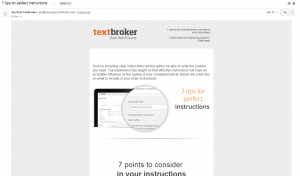Weeks after the Fappening has once again brought about a revived interest in protecting privacy. But when you protect privacy, critics of this advocacy are inextricably linked to the same people who demand more transparency from companies (and their marketers). In other words, no more secrets. You have nothing to fear if you have nothing to hide.
What does this leave B2B marketers In the B2B industry, this often leads to at least one implication that is often ignored by others: the loss of trade secrets.
 Just recently, the U.S. Congress was just considering a new law on trade secrets. In a world where both B2B and B2C customers are demanding transparency, it’s almost an oxymoron.
Just recently, the U.S. Congress was just considering a new law on trade secrets. In a world where both B2B and B2C customers are demanding transparency, it’s almost an oxymoron.
On the one hand, customers are making it clear that they are not all comfortable with businesses tracking every second of behavior. In spite of the intention to push more relevant content or products, the question of ethics remains the same. On the other hand, certain marketing strategies can be trade secrets in of themselves. To give them away could leave several companies at a devastating disadvantage against competitors.
For example, say the secret of your successful appointment strategy involves a sophisticated mix of outsourced telemarketing and in-house technology. The secrecy behind this technology, however, has come under the scrutiny of regulators. They don’t like it. They feel that the people deserve to know how you’re doing it.
You want to know what actual company is having this kind of trouble?
Yet, who’s to say that Google will be the only company struggling to balance a respect for a prospect’s privacy and the need to better track, understand, and gain an edge over competitors? There’s no hard and fast answer. This is something every company has to figure out through raw experience. The following guidelines though can be useful:
- Have a ToS – You’re right, not many people really read this. However, that means it’s a good thing that the B2B buying process still involves some heavy reading. So if you’re planning on using a white paper to obtain some customer data, this gives them a reference in case they’d like to opt-out.
- Allow them to opt-out – Speaking of which, giving a way out to your prospects is obviously another way to show you respect their liberty. If they don’t like to receive any more newsletters or emails, then this is their way of letting you know.
- Give them something worthwhile– You’ll only find more proof that content is king when it comes to today’s marketing. If you provide content that’s informative and relevant, you’ll know when a prospect thinks it’s worth the price of sharing more information with your business.
Lack of information has become the difference between a successful marketing campaign and a costly one. But at the same time, this race has been a cause for alarm among customers who value their privacy. Perhaps the real success in the information age lies in the balancing act of acquiring information and not just information itself.
Business Articles | Business 2 Community
(426)







